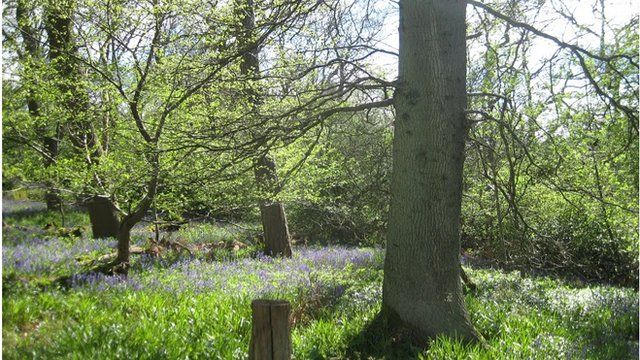Signs of spring 'shifting' in trees
- Published

Scientists say signs of spring are appearing earlier in woodlands because of temperature rises in past decades.
They predict that climate change will alter the order in which different trees start to grow leaves, with long-term implications for the survival of some woodland plants.
A 200-year-old record from a Norfolk estate shows warmer springs are causing most woodland plants to leaf earlier.
But warmer autumns are having the opposite effect on some species.
It is shifting the timing of when different trees grow leaves and flowers, according to biologists at the University of Edinburgh.
The researchers predict that trees like the oak, which are normally cloaked in leaves relatively late in spring, will soon overtake trees such as the hawthorn and silver birch that traditionally leaf early.
In the long-term, the survival of some woodland plants could be affected as plants compete for light under the woodland canopy.
The scientists, led by Dr Ally Phillimore of the University of Edinburgh, say that forest species vary substantially in their sensitivity to winter and spring temperatures.
"Our projections reveal that this may lead to a substantial shuffling of the order of flowering and leafing events in temperate forests," they report in the journal Global Change Biology.
Dr Phillimore added: "We've got one of the strongest demonstrations of what a strong effect a warm autumn has on the timing of leafing."
Citizen science
The study is based on a record of woodland plants at an estate in Norfolk that was started in 1736 by Robert Marsham.
After his death in 1797, other family members carried on recording 27 indications of spring until 1958, creating one of the longest running records of its kind in the world.
Researchers at Edinburgh University studied the leafing dates of 14 forest species from Stratton Strawless Hall in Norfolk between 1753 and 1947.
They also analysed temperature records for this time period, projected future temperatures in the UK based on burning fossil fuels, and recent spring records of oak and birch trees compiled by citizen scientists.
Adrian Roberts of Biomathematics and Statistics Scotland said: "State-of-the-art statistical methods help us to use citizen science observations in developing valuable insights into how changes in our climate might affect woodland communities."
The Woodland Trust and Centre for Ecology and Hydrology have carried on the work of Robert Marsham and members of the public can record signs of spring on the Nature's Calendar website.
- Published2 March 2015